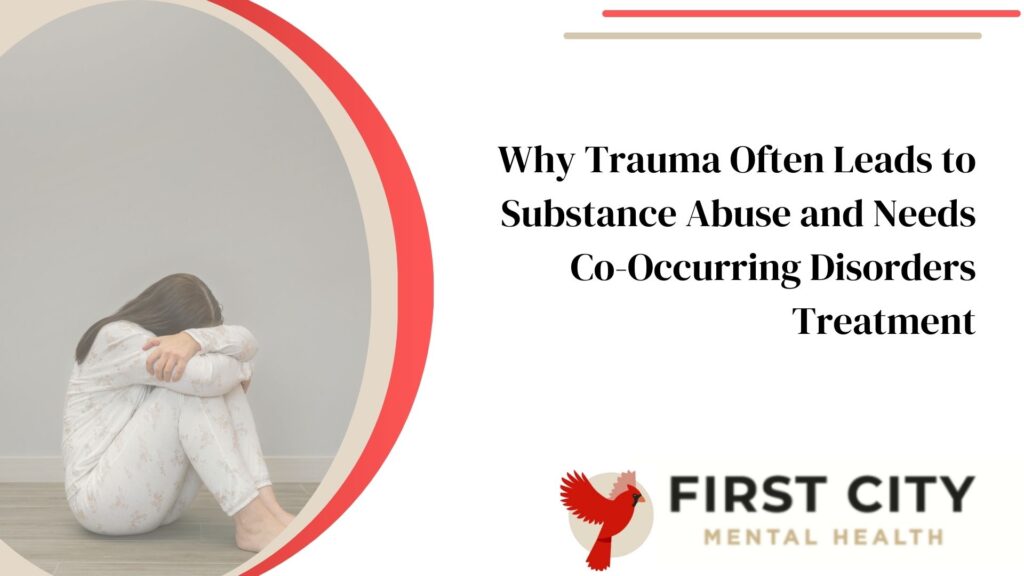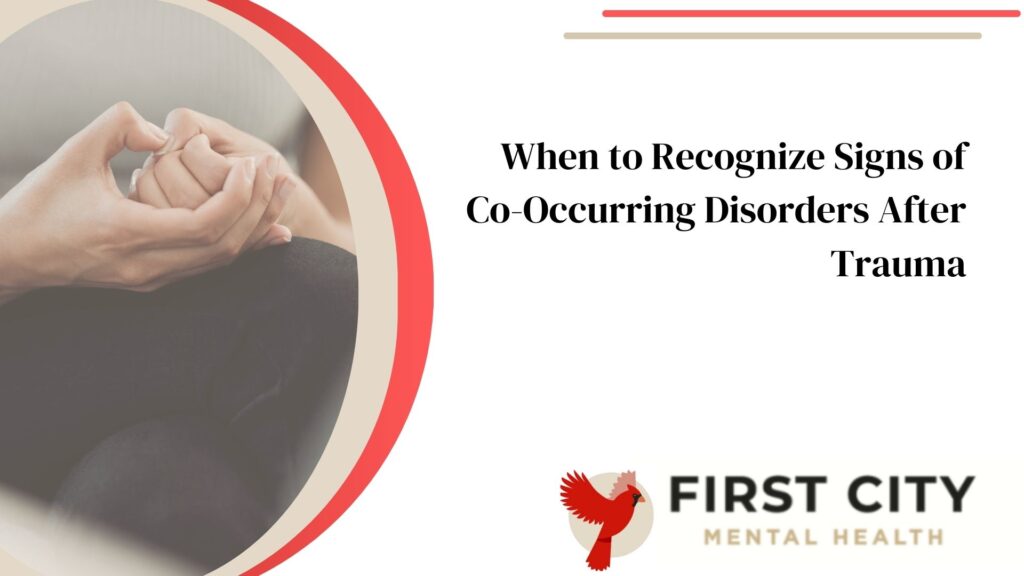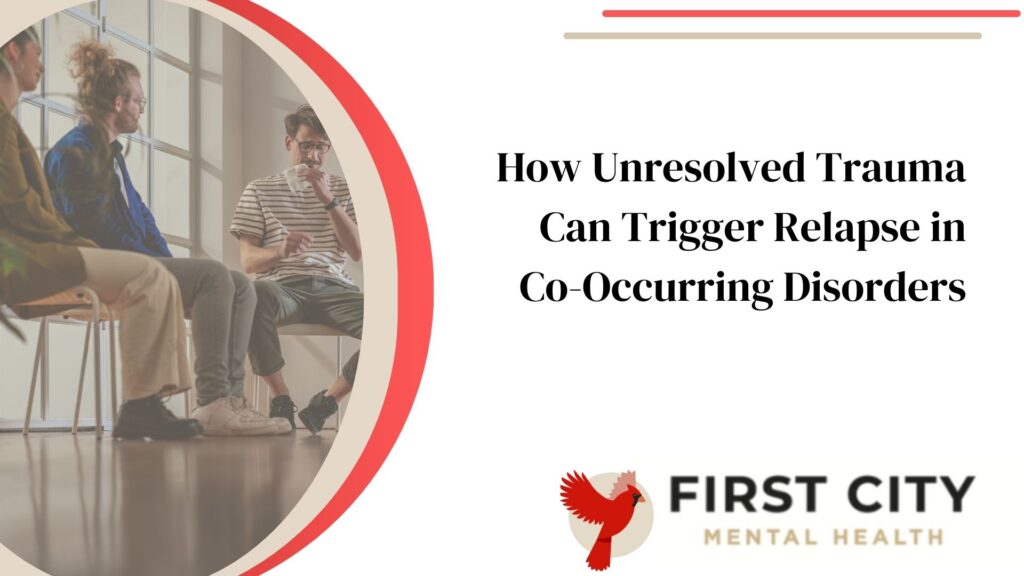
When Should You Seek Help for Co-Occurring Disorders Treatment?
January 21, 2025
Where to Begin: First Steps in Co-Occurring Disorders Treatment
January 21, 2025Understanding the intricate link between trauma and the development of co-occurring disorders is crucial for effective treatment. Trauma often serves as a catalyst, setting the stage for complex psychological conditions that necessitate specialized co-occurring disorders treatment. Identifying the signs early can be pivotal in addressing both the psychological impact of trauma and any resulting substance use or mental health issues. This introduction highlights the importance of recognizing these interconnected challenges, offering insight into what individuals and their loved ones should watch for when seeking help.
Key Takeaways
- Recognizing the profound link between trauma and mental health disorders is crucial for effective treatment, highlighting the importance of addressing both issues simultaneously for those struggling with co-occurring disorders.
- Understanding that trauma often leads to substance abuse can guide individuals and healthcare providers toward more compassionate, co-occurring disorders treatment care approaches that treat the root causes, not just the symptoms.
- Acknowledging how early childhood trauma impacts adult mental health is critical to identifying and treating co-occurring disorders, emphasizing the need for early intervention and support.
What Is the Link Between Trauma and Mental Health Disorders?
Trauma can profoundly impact an individual’s mental health, often leading to co-occurring disorders treatment. These are situations where a person suffers from both mental health issues and substance abuse problems. The trauma, which might stem from events like accidents, abuse, or natural disasters, acts as a catalyst for mental health disorders. It triggers mechanisms in the brain that may lead to anxiety, depression, or P.T.S.D. Over time, individuals may turn to substances as a form of self-medication, attempting to alleviate the pain and distress caused by these mental health conditions.
In places like co-occurring disorders treatment in Kokomo, Indiana, programs recognize the intricate link between trauma and mental health disorders. They offer co-occurring disorders treatment tailored to address both aspects simultaneously. This approach is vital because treating one issue while neglecting the other can hinder recovery. Effective treatment plans often include therapy, medication management, and support groups. They focus on healing from trauma while also tackling the substance use disorder head-on.
The relationship between trauma and mental health disorders is complex, but understanding it is crucial for effective intervention. Programs specializing in co-occurring disorders treatment in Kokomo, Indiana, demonstrate how integrated care can significantly improve outcomes for affected individuals. They provide a roadmap for recovery that acknowledges the intertwined nature of trauma and mental health issues, ensuring that patients receive comprehensive care tailored to their unique needs.
Why Trauma Often Leads to Substance Abuse and Needs Co-Occurring Disorders Treatment

Trauma can profoundly affect an individual’s mental and emotional state. It often leaves scars that are not visible to the naked eye. These emotional wounds can lead to various coping mechanisms, some harmful. Substance abuse is a common way people try to manage their pain and memories associated with trauma. They might turn to drugs or alcohol as a temporary escape from their suffering.
Substances can provide a momentary relief from the distress caused by traumatic events. This relief is, however, short-lived. Over time, reliance on substances can develop into an addiction. This complicates the individual’s mental health further, leading to co-occurring disorders. Co occurring disorders treatment is complex because it needs to address both the substance use and the underlying trauma.
The link between trauma and substance abuse highlights the importance of integrated treatment approaches. Such approaches consider both the psychological impact of trauma and the physical dependence on substances. They offer more comprehensive care than treating one issue at a time. Effective co-occurring disorders treatment programs recognize the need for this dual approach. They aim to heal both the mind and body, offering therapies that address trauma directly while also helping individuals build healthier coping mechanisms with co-occurring disorders treatment.
How Early Childhood Trauma Impacts Adult Mental Health
Early childhood trauma can have a profound impact on adult mental health. It often sets the stage for complex psychological issues. These issues may include anxiety, depression, and post-traumatic stress disorder (PTSD). The roots of these problems frequently trace back to traumatic experiences in early life.
These experiences disrupt the normal development of coping mechanisms. As a result, individuals may struggle with emotional regulation and interpersonal relationships. They might find it hard to trust others or feel safe in their environments. This struggle often leads to a heightened sense of vulnerability.
Integrated treatment for co-occurring disorders is crucial in addressing these intertwined challenges. This approach considers both the mental health condition and any substance abuse issues together. It recognizes that treating one without the other is often ineffective. For those who have turned to substance use as a way to cope with trauma, this comprehensive co-occurring disorders treatment is vital.
It aims to heal the symptoms and the underlying causes of distress. Professionals in this field work to develop tailored strategies. These strategies help individuals build resilience and healthier coping mechanisms. By doing so, they address the long-term impacts of early childhood trauma on adult mental health.
The link between early childhood trauma and adult substance abuse underscores the need for integrated care. Such co-occurring disorders treatment care helps individuals navigate the complexities of their experiences. It provides them with the tools they need for recovery and well-being.
When to Recognize Signs of Co-Occurring Disorders After Trauma

Recognizing signs of treatment for co-occurring disorders following trauma is crucial. It often starts with changes in behavior or mood. Victims might experience intense anxiety and depression or turn to substance abuse as a coping mechanism. These symptoms can surface weeks, months, or even years after the traumatic event.
It’s essential to monitor for persistent sadness, withdrawal from social activities, or an increased use of alcohol or drugs. Sleep disturbances and unexplained physical complaints are also red flags. Early detection plays a crucial role in effective treatment for co-occurring disorders. Without prompt intervention, these conditions can worsen, leading to more severe mental health issues and addiction problems.
Professionals recommend seeking help when symptoms persist or significantly impact daily life. Treatment for co-occurring disorders typically involves a combination of therapy, medication, and support groups. This integrated approach addresses both mental health and substance abuse issues together rather than separately. Treating both conditions simultaneously gives individuals a better chance at full recovery.
Family members and friends play a vital role in supporting loved ones through this process. They can encourage them to seek professional help and offer emotional support throughout their recovery. Creating a supportive environment is crucial for healing with co-occurring disorders treatment.
Where Trauma Treatment Fits Into Recovery from Co-Occurring Disorders
Recognizing signs of co-occurring disorders after trauma is a crucial first step. The journey continues with understanding where trauma treatment fits into the recovery process. Co-occurring disorders treatment centers specialize in addressing both mental health issues and substance use disorders simultaneously. This dual approach is essential because trauma often underlies many co-occurring disorders.
Treatment centers integrate trauma-informed care to ensure a safe and supportive environment for healing. This means that every aspect of care is designed with an awareness of trauma’s impact on the individual. Staff are trained to recognize the signs of trauma and respond appropriately. This approach helps prevent re-traumatization and supports the recovery process.
Trauma treatment within these centers often involves evidence-based therapies like Cognitive Behavioral Therapy (CBT) and Eye Movement Desensitization and Reprocessing (E.M.D.R.). These therapies help individuals process their traumatic experiences and develop coping strategies. They also address the symptoms of any co-occurring mental health disorders, such as anxiety or depression.
Incorporating trauma treatment into the recovery plan is vital. It acknowledges the profound effect trauma has on mental health and substance use disorders. Recovery from co-occurring disorders is more successful when treatment addresses both the symptoms and the root causes of these conditions. By focusing on trauma, treatment centers offer a more comprehensive and practical approach to recovery.
What Are the Common Symptoms of Trauma-Related Co-Occurring Disorders?
Trauma-related co-occurring disorders present a complex interplay of symptoms. Individuals often experience emotional and psychological distress that significantly impacts their daily lives. Anxiety, depression, and post-traumatic stress disorder (P.T.S.D.) are common among those facing these challenges. These conditions can profoundly affect mood, behavior, and one’s ability to cope with stress.
People dealing with trauma-related co-occurring disorders may also show signs of substance abuse. This is frequently an attempt to self-medicate the symptoms of their mental health issues. It’s not uncommon for individuals to turn to alcohol, drugs, or prescription medication as a form of escape from their emotional pain. Unfortunately, this only compounds their problems over time.
Physical symptoms can manifest as well. Sleep disturbances, such as insomnia or nightmares, are prevalent. So are unexplained physical ailments like chronic pain or digestive issues. These symptoms often lead to a vicious cycle of discomfort and distress, further aggravating the individual’s condition.
Another key indicator is behavioral changes. People might withdraw from social activities they once enjoyed, or exhibit increased irritability and aggression. Their performance at work or school may decline, and relationships can suffer.
Recognizing these symptoms is crucial for effective intervention. Adult co-occurring disorders treatment focuses on addressing both the mental health and substance abuse aspects simultaneously. This integrated approach is vital for holistic healing and long-term recovery.
Why Addressing Trauma Is Critical for Long-Term Recovery
Understanding the symptoms of trauma-related co-occurring disorders is just the beginning. For those battling these conditions, addressing trauma is not optional; it’s essential. Trauma acts as a root cause, fueling both mental health issues and substance use disorders. Without tackling this underlying issue, co-occurring disorders treatment might not be fully effective.
Effective recovery programs recognize the intertwined nature of trauma and co-occurring disorders. They employ integrated treatment plans that focus on healing both aspects simultaneously. This approach ensures that individuals do not just cope but truly recover. It addresses the symptoms and their origins, laying a foundation for lasting wellness.
Trauma-informed care is a cornerstone in treating co-occurring disorders. It creates a safe environment for individuals to explore and heal from traumatic experiences. Such environments foster trust and understanding, which are crucial elements for recovery. Therapists trained in trauma care use specific strategies to help patients navigate their pasts without re-traumatization.
Moreover, research shows that individuals who receive comprehensive treatment for co occurring disorders, including trauma-focused therapy, have better outcomes. They report lower levels of substance use, improved mental health symptoms, and higher quality of life post-treatment. These findings highlight the importance of addressing trauma for anyone seeking long-term recovery from co-occurring disorders.
How Unresolved Trauma Can Trigger Relapse in Co-Occurring Disorders

Unresolved trauma plays a significant role in the relapse of co-occurring disorders. It acts as a deep-rooted trigger that can disrupt the recovery process. Individuals with co-occurring disorders often face a complex battle where mental health issues and substance abuse feed into each other. Without addressing the underlying trauma, treatment can only scratch the surface.
A treatment of co-occurring disorders program aims to provide holistic care. It tackles both the symptoms and the root causes of these intertwined issues. However, if trauma remains unaddressed, it can lead to emotional instability. This instability often pushes individuals towards substance use as a coping mechanism. The cycle of relapse becomes hard to break without confronting and healing from past traumas.
Moreover, unresolved trauma can undermine the effectiveness of treatment for co-occurring disorders. It can lead to mistrust between the patient and healthcare providers, reducing engagement in the treatment process. Patients may find it challenging to participate fully in therapy sessions or to adhere to medication regimens. They might also struggle with building supportive relationships, further isolating them and increasing the risk of relapse.
Effective co-occurring disorders treatment must include trauma-informed care. This approach recognizes the prevalence of trauma and its impact on mental health and substance abuse. By directly integrating strategies to address trauma, healthcare providers can support more successful recovery outcomes. They help patients develop healthy coping mechanisms that do not involve substance use, reducing the likelihood of relapse.
Closing Thoughts
The exploration of the intricate relationship between trauma and co-occurring disorders treatment underscores the necessity for integrated treatment approaches. Experts emphasize that addressing both trauma and substance abuse concurrently offers the best chance for long-term recovery. This holistic approach ensures that the root causes of substance abuse are confronted, reducing the risk of relapse significantly. It highlights the critical role that understanding and treating trauma plays in the recovery process for individuals with co-occurring disorders. The evidence suggests that without recognizing and addressing the underlying trauma, the cycle of substance abuse and mental health issues may continue unabated.
For those grappling with co-occurring disorders, seeking a co-occurring disorders treatment program that specializes in trauma-informed care is paramount. Such programs offer hope, providing the tools needed for healing and recovery. Individuals and their loved ones must advocate for comprehensive care that addresses all facets of co-occurring disorders. The journey toward recovery is challenging but achievable with the proper support and treatment approach. Let this be a call to action for anyone affected by these issues to seek out and embrace the specialized care required for a healthier, more stable future.
F.A.Q.s
1. How Can Trauma Increase the Risk of Co-occurring Disorders?
Trauma can profoundly impact mental health, often leading to conditions like anxiety, depression, or PTSD. In many cases, individuals turn to substance use as a way to cope with emotional pain, which can result in the development of co-occurring disorders.
2. What Are Common Signs That Trauma Is Linked to Co-occurring Disorders?
Look for signs like persistent anxiety, depression, nightmares, flashbacks, or avoidance behaviors alongside substance use. If emotional struggles and substance use seem to intensify together, it may indicate a co-occurring disorder related to trauma.
3. How Does Untreated Trauma Affect Recovery From Co-occurring Disorders?
Untreated trauma can make recovery challenging, as emotional pain might trigger continued substance use. Addressing the root cause—trauma—alongside substance use is crucial for effective treatment and long-term recovery.
4. What Should You Do If You Suspect Trauma Has Led to Co-occurring Disorders?
If you believe trauma has contributed to your substance use or mental health struggles, it’s essential to seek professional help. Trauma-informed treatment, which addresses both emotional and addiction-related issues, is key to successful recovery.






